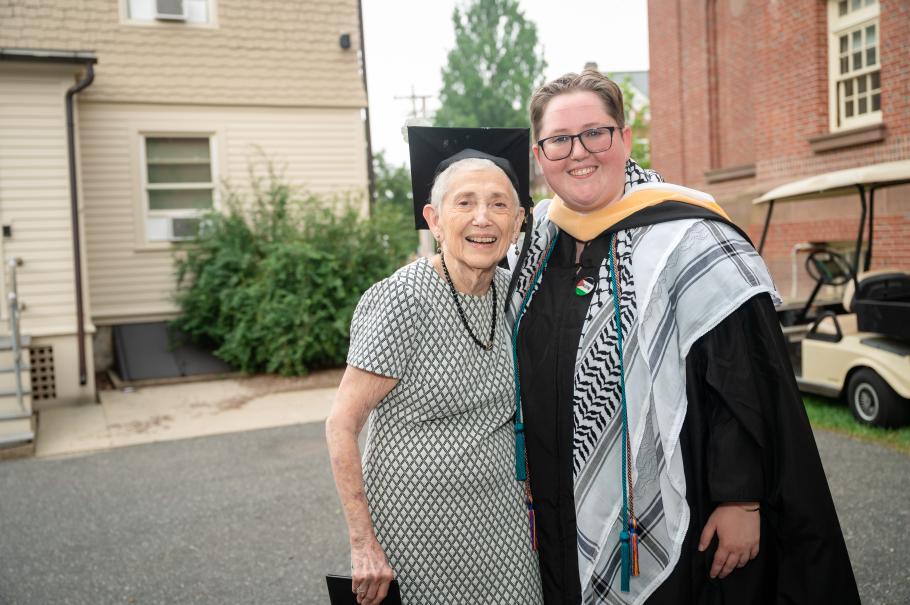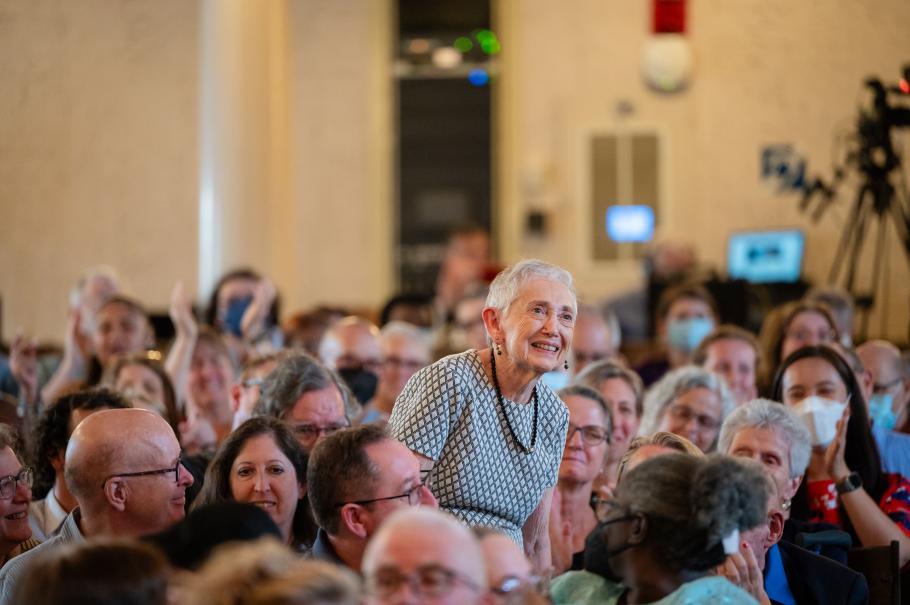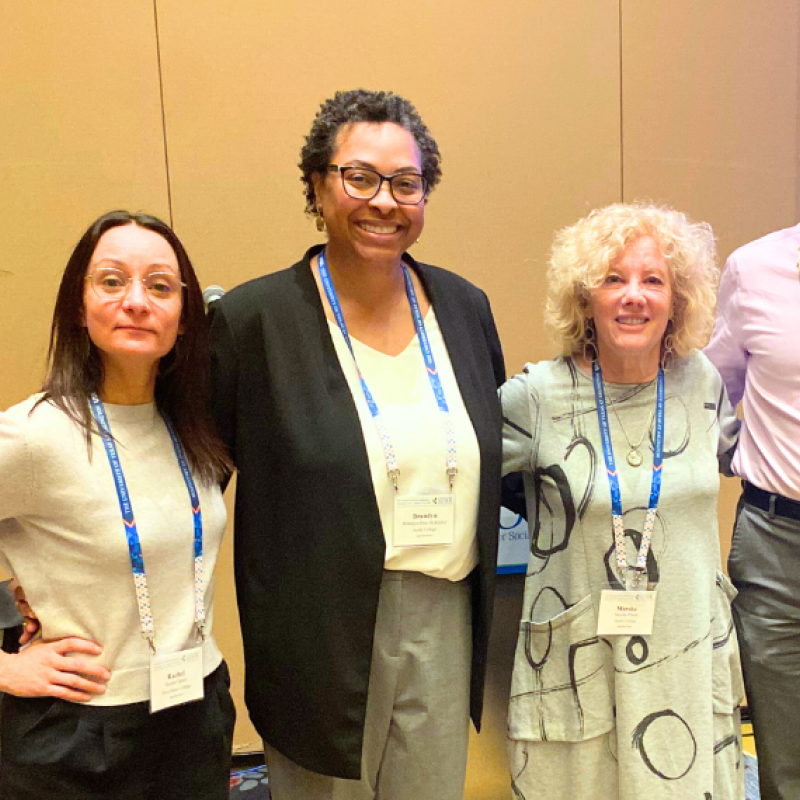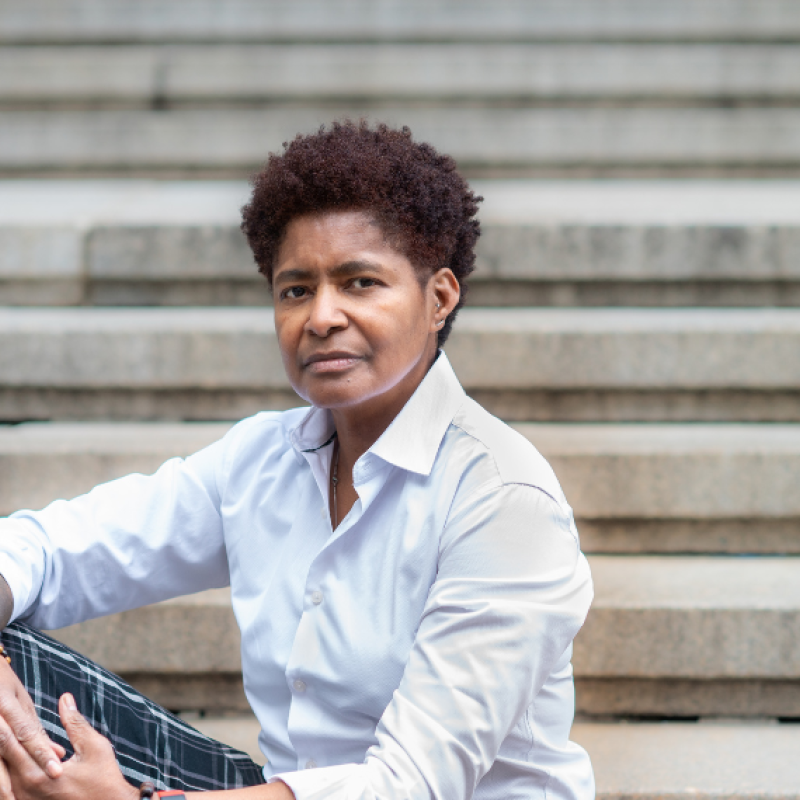When Reeve Buchdahl M.S.W. ’24 graduated from the Smith School for Social Work this past summer, they became the latest Buchdahl to join the family profession. Reeve celebrated their degree with their dad, Ezra Buchdahl, a social worker who just started his first academic year as a practicum faculty advisor at SSW, and grandmother Sheila Buchdahl M.S.W. ’64, a retired family therapist.

“Growing up, I always heard my grandmother telling stories about Smith, be it her time on the campus or people she is still friends with from there,” Reeve said.
Sheila Buchdahl knew from her Los Angeles childhood that she wanted to work in social services, like her mother did. She applied to Columbia and Smith.
“I chose Smith because I wanted to go to the east coast,” she said. “I liked the program. I especially liked the idea of being sent somewhere else, the adventure of not knowing where I was going to be for practicum.” In the 1960s, Sheila explained, SSW did not allow students to indicate preference for where in the nation they would be assigned to complete their clinical hours each year.
A random practicum adventure did not end up quite working out in her case. Midway through her road trip from California to Northampton, Sheila stopped in Cincinnati to visit an ex-boyfriend.
“We had broken up a year before,” she said. That ex-beau, Rabbi Gustav Buchdahl, soon became her husband, and she was able to request internships in Cincinnati to remain with him.
“We like to joke that that’s why she married my grandfather, so she could choose where her placement was,” Reeve said. Sheila’s growing family – Ezra has one brother and one sister – meant it took her an extra year to graduate from SSW, after which the family settled in Baltimore and she stayed home for five years before starting a role as a hospital social worker in outpatient child psychiatry. There, she was exposed to a then-new modality – family systems work – that became her professional passion.
“That was the focus of my career, really. That’s still how I think: Everything is a system with me,” Sheila said.
Ezra grew up visiting Sheila’s office. “I’d been doing play therapy, and I had a lot of toys, so I think that may have had an influence on why he became a social worker,” she said.

Whether or not therapeutic toys planted the idea, Ezra also went into child welfare and behavioral health. Besides his newer role at SSW, advising students interning in the Washington DC area, Ezra has long worked at Catholic Charities of Maryland, primarily as an administrator in a residential treatment center and special education school.
“I can never remember a time when that wasn’t what I wanted to do,” he said. At SSW, he is continuing his long-held love of supervising newer clinicians.
“I love seeing budding social workers grow and develop and start their career,” he said, adding that Sheila’s example also influenced his mentorship style. “I often quote my mother when talking to interns,” he said. “There are a couple of things I tend to always repeat: one is that everyone has baggage, but some people have a carry-on bag, and some people have a trunk – it’s how it’s packed that matters. The second one is the core underlying issue people struggle with regardless of their age, their history, is around separation and loss. If you can help people learn how to cope with issues of separation and loss, then they’re on the way to healing.”
Like Ezra’s early exposure to his mother’s professional life, Reeve spent their formative years participating in their father’s work. “I grew up volunteering at my dad’s work really often,” they said. “I didn't feel pressured, I felt like – dad, correct me if I'm wrong – I think you always kind of knew that was where I was going to end up.”
“Something that I've been quoting my grandmother on a lot is that everything is family therapy. Even if you’re just working with an individual, or if you're working with a couple, or whatever it is, everything is family therapy.”
“I didn't know you were going to end up in social work,” Ezra responded. “I always thought that you would make an excellent social worker if that’s what you chose to do … When I heard you were going to Smith I was very excited, because I knew you would make a difference in the field.”
But Reeve’s entry into the field was not foregone; they started college intent on becoming a theater actor. Then, the pandemic shut down the entire industry.
“When Covid hit, I was like, ‘What would it look like if I added a psychology minor?’ I don’t think either of you were necessarily surprised,” they said to their relatives, who both smiled in response. “As I kind of got into the profession, I started getting different internships while I was in undergrad, and I realized that was what I really wanted to do.”
Reeve graduated at the end of the past summer term and just started their post-master’s work in a group practice in Durham, North Carolina focusing on supporting queer and transgender transitional aged youths and their parents.
“That’s where my grandmother influenced me a lot – that I realized I want to do a lot more family therapy, which wasn’t what I was expecting when I started taking classes,” they said. “Something that I've been quoting my grandmother on a lot is that everything is family therapy. Even if you’re just working with an individual, or if you're working with a couple, or whatever it is, everything is family therapy.”


